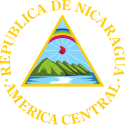Multiethnic Party for Coast Unity
Look at other dictionaries:
Elections in Nicaragua — gives information on elections and election results in Nicaragua. The Republic of Nicaragua elects on national level a head of state ndash; the president ndash; and a legislature. The President of Nicaragua and his or her vice president are… … Wikipedia
List of Nicaragua-related articles — This is an alphabetical list (index) of people, places, things, and concepts related to or originating from Nicaragua. Entries pertaining to people are generally alphabetized by first (given) name. NOTOC A.ni • 100% Noticias, El Canal • 1966… … Wikipedia
List of political parties in Nicaragua — Political parties in Nicaragua lists political parties in Nicaragua. Nicaragua has a two party system, which means that there are two dominant political parties. This makes it extremely difficult for anybody to achieve electoral success under the … Wikipedia
Russia — /rush euh/, n. 1. Also called Russian Empire. Russian, Rossiya. a former empire in E Europe and N and W Asia: overthrown by the Russian Revolution 1917. Cap.: St. Petersburg (1703 1917). 2. See Union of Soviet Socialist Republics. 3. See Russian… … Universalium
India — /in dee euh/, n. 1. Hindi, Bharat. a republic in S Asia: a union comprising 25 states and 7 union territories; formerly a British colony; gained independence Aug. 15, 1947; became a republic within the Commonwealth of Nations Jan. 26, 1950.… … Universalium
literature — /lit euhr euh cheuhr, choor , li treuh /, n. 1. writings in which expression and form, in connection with ideas of permanent and universal interest, are characteristic or essential features, as poetry, novels, history, biography, and essays. 2.… … Universalium
France — /frans, frahns/; Fr. /frddahonns/, n. 1. Anatole /ann nann tawl /, (Jacques Anatole Thibault), 1844 1924, French novelist and essayist: Nobel prize 1921. 2. a republic in W Europe. 58,470,421; 212,736 sq. mi. (550,985 sq. km). Cap.: Paris. 3.… … Universalium
Germany — /jerr meuh nee/, n. a republic in central Europe: after World War II divided into four zones, British, French, U.S., and Soviet, and in 1949 into East Germany and West Germany; East and West Germany were reunited in 1990. 84,068,216; 137,852 sq.… … Universalium
Denmark — /den mahrk/, n. a kingdom in N Europe, on the Jutland peninsula and adjacent islands. 5,268,775; 16,576 sq. mi. (42,930 sq. km). Cap.: Copenhagen. * * * Denmark Introduction Denmark Background: Once the seat of Viking raiders and later a major… … Universalium
cañada — /keuhn yah deuh, yad euh/, n. Chiefly Western U.S. 1. a dry riverbed. 2. a small, deep canyon. [1840 50; < Sp, equiv. to cañ(a) CANE + ada n. suffix] * * * Canada Introduction Canada Background: A land of vast distances and rich natural resources … Universalium

